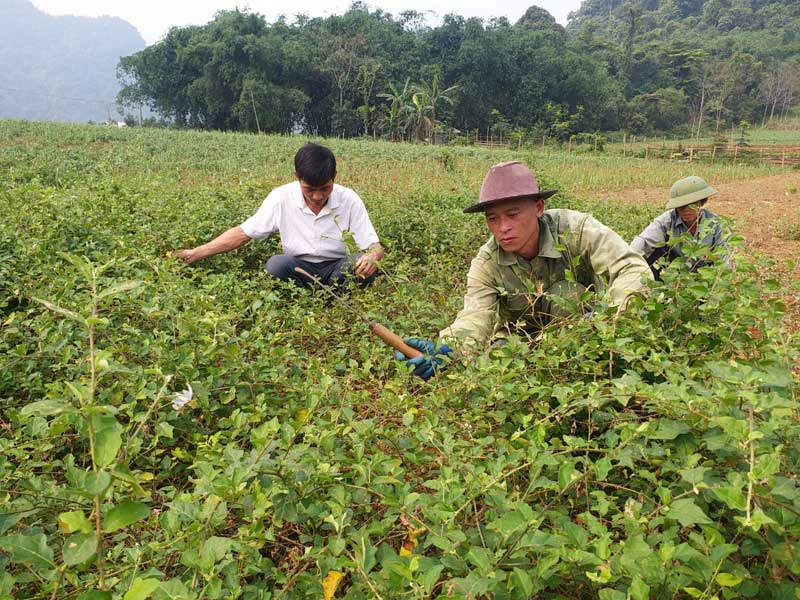
(HBO) – Solanum jelly and solanum tea infuser bags developed by Bao Hieu agro-forestry cooperative in Yen Thuy district and its partners have won the taste of many consumers inside and outside the province.
 Member of the Bao
Hieu agro-forestry cooperative harvest solanum in Nhuoi hamlet, Da Phuc commune.
Member of the Bao
Hieu agro-forestry cooperative harvest solanum in Nhuoi hamlet, Da Phuc commune.
Plantation of solanum trilobatum (also solanum) was piloted in Da Phuc commune,
Yen Thuy district under the poverty alleviation programme in 2015. Thanks to
fertile soil and favourable conditions, the plant has been well developed in
the locality, with pharmacological properties four times higher than when it is
grown in other areas.
The Bao Hieu agro-forestry cooperative was established to mobilise local
farmers to cultivate solanum.
In 2018, it produced more than 200,000 solanum saplings, and worked to find
markets for the herb. Farmers in Dam hamlet are growing the herb in an area of
40 hectares as compared to 10 hectares in 2016. The herb is sold at stable
price of 35,000 VND per kilogramme, bringing about 400 million VND in revenue
for local farmers.
As an important medicinal plant, solanum is said to be among the best solutions
to detoxifying liver; lowering liver enzyme levels; supporting to treat
Hepatitis B, fatty liver, hyperlipidemia and cirrhosis; easing gout pain;
treating rashes caused by liver failure; treating rheumatism, backache and
cough due to sore throat.
With support from scientists and competent agencies in the district and
province, Bao Hieu cooperative has applied the Good Agricultural and Collection
Practices (GACP) standards into cultivation, harvest, transport, processing,
packaging and preservation.
It has teamed up with OPC Bac Giang Pharmaceutical joint Stock Company to create
solanum jelly, and Thuong Hao One Member Limited Company and Sao Mai
Pharmaceutical joint Stock Company to make solanum tea.
Around 25,000 – 30,000 solanum jelly products are sold in the market each year.
It has received copyright certification, and been favoured by many customers.
Besides being distributed in a network of 200 agents in the country, the
product has been well sold in Russia, Thailand and China.
Particularly, solanum jelly, an OCOP item of Yen Thuy district, was certified
with three-star standard in 2019, helping the locality reach out to new markets
while ensuring sustainable livelihoods for local people./.
The Standing Board of the Hoa Binh provincial Party Committee has agreed in principle on a proposal by the Standing Board of the Party Committee of Hoa Binh city to gather feedback on the city’s 1:2000 zoning plan, which forms part of its broader urban development strategy.
Hoa Binh province has made notable progress in public administration reform and digital government development, with the satisfaction index among citizens and businesses reaching over 84%, according to recent government evaluations.
Thanks to great efforts by local authorities in recent times, the governance and public administration performance of Mai Chau district has been significantly improved.
In the afternoon of June 6, the Party Committee, the People's Council, the People's Committee and the Fatherland Front of Lac Son district solemnly held a meeting to celebrate the 139th anniversary of the district's founding (1886–2025) and the 79th anniversary of the establishment of the district's Party Committee (1946–2025). There was the attendance of Mr. Bui Van Thang, the Vice Chairman of the Provincial People's Council; Mr. Quach Tat Liem, the Vice Chairman of the Provincial People's Committee; Ms. Dang Bich Ngoc, the Deputy Head of the National Assembly Delegation of the province; as well as the former leaders of the province and district through various periods, who are the natives of the district.
Implementing the Politburo’s Resolution No. 57-NQ/TW on breakthroughs in science – technology, innovation, and digital transformation is a golden opportunity for the northern mountainous province of Hoa Binh to renew growth model, improve competitive edge and shorten digital gap.
Resolution 57-NQ/TW, issued by the Politburo on December 22, 2024, identifies sci-tech, innovation, and digital transformation as strategic breakthroughs to build a developed and prosperous nation. In Hoa Binh province, this spirit is not just a slogan, it’s being put into action through concrete initiatives that form a "new development triangle”: digital citizenship, digital economy, and digital administration.



 Member of the Bao
Hieu agro-forestry cooperative harvest solanum in Nhuoi hamlet, Da Phuc commune.
Member of the Bao
Hieu agro-forestry cooperative harvest solanum in Nhuoi hamlet, Da Phuc commune.